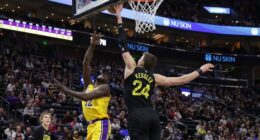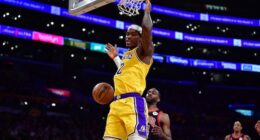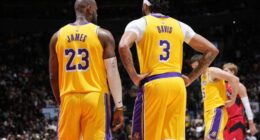
“It doesn’t matter to me; I don’t read the headlines,” he said. “There’s a bank in every city, and I’m going to play hard basketball wherever I go, so I’m good.”
Most interpreted the quote to mean that Bynum only plays for the money. But few knew that he was being asked what it was like being the constant subject of trade rumors, something Bynum had to deal from the moment the Lakers drafted him. Then there’s the second part of the quote, where he says “I’m going to play hard basketball wherever I go, so I’m good.” When added up, Bynum was basically saying that he doesn’t let the trade rumors get to him because his contract won’t be voided if he gets traded and the only thing he has control over is how hard he’s willing to play. I can see why people would misinterpret the quote but I would rather choose to acknowledge what it is he was really trying to say. Now flash forward to the present. Here’s what McMenamin wrote about Bynum:
“I thought it really helped me a lot obviously at first, because he draws so much attention it’s hard for guys to double team and key on you, so it helped me tremendously,” Bynum told a group of L.A. reporters before the Lakers played the Sixers on Sunday. “Later, I felt I was able to get the ball more and do more things with the ball, so I could definitely see how it could stunt growth.”
When McMenamin relayed to Kobe what Bynum had said, Kobe didn’t disagree with him. He even went so far as to compare their dynamic to the one Kobe 
It wasn’t until the 2011-12 season when Bynum became his team’s second option on offense. He responded positively by averaging 19 points and 12 rebounds a game. But each of Bynum’s previous seasons prior to last year was as unpredictable as a roll of dice. Take the consecutive playoff series that Bynum played against the Jazz and Suns in May 2010. Excluding the one game in which he played fewer than 18 minutes, Bynum scored 8, 17, 0, 6, 4, 13, 12, 2, and 10 points in nine games. If Bynum was stunted it was because he was inconsistent, and he was inconsistent because more often than not he had the attention span of a fly.
In addition to his bouts with focus, Bynum’s conditioning was always a factor. Of course, you can’t use the words “stunted development” and “Andrew Bynum” without mentioning his knee injuries. But even without the injuries there were questions about his conditioning. As a rookie, Bynum only played 338 minutes in 46 games. I’m fully aware that he was a teenager and that Phil Jackson was never really a fan of rookies, but it wasn’t like he was sitting on the bench because he was backing up Shaq. He was behind Kwame Brown and Chris Mihm on the depth chart.
It was that lack of conditioning that resulted in him constantly getting caught out of position on defense and constantly committing unnecessary fouls. The early foul trouble led to him getting replaced in games much sooner than he should have been, thus reducing his minutes, and making it even more difficult for him to get in shape without those minutes. None of that is Kobe’s fault.
In the 68 combined regular season and playoff games that Bynum played in 2008-09, he fouled out once, committed five fouls 15 times, and was called for four fouls 16 times. That means in 32 games, nearly half of those he played that season, he was in foul trouble. That doesn’t include all the games in which he would get in early foul trouble, play a reduced number of minutes, and screw up the rotation for the remainder of the game. For example, Bynum committed three fouls in Games 2, 3, and 4 of the Lakers’ Western Conference Semifinals series with the Rockets yet only played 8, 12, and 11 minutes because of early foul trouble.
I like Andrew Bynum. I think he got a bad rap from the fans out here. He’s right when he says that the offense might have been too centered around Kobe. But that has nothing to do with his development. I wish him luck in Philadelphia and I hope he has a long and productive career. But the notion that Kobe is responsible for even a tiny fraction of what stunted his development as a professional basketball player is laughable. It’s about time he took sole responsibility for being the player he is.



